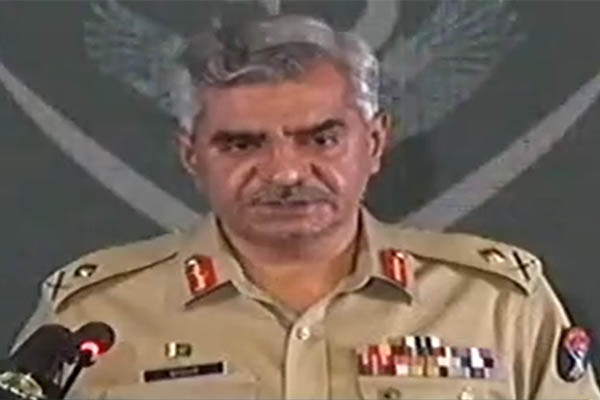
Screengrab of Maj. Gen. Babar Iftikhar’s press briefing
ISPR spokesman vows that armed forces are ready for any eventuality on the Pak-Afghan border
India has “no love lost” for the Afghan population and its actions in Afghanistan were solely intended to damage Pakistan, Inter-Services Public Relations (ISPR) Maj. Gen. Babar Iftikhar alleged on Friday.
“We need to understand what has been India’s role [in Afghanistan],” he told a press briefing organized to brief media on the Afghanistan situation, adding that Delhi’s “investment” and “clout” in the war-torn state had been intended solely to harm Pakistan. “The Pakistan political and military leadership kept reaching out to Afghanistan, but whenever we would go there; the moment we got back, there used to be a negative statement from Afghanistan,” he said, alleging that the government of Ashraf Ghani had “poisoned” the minds of the Afghan military and intelligence.
Reiterating allegations of Afghanistan’s spy agency working with India’s RAW to facilitate various terrorist groups such as the Tehreek-e-Taliban Pakistan and Daesh, he said the entire goal was to hurt Pakistan. “If they [Afghanistan’s spy agency] were doing their own job, they would have been much better prepared to take on what’s happening today,” he said, stressing that India’s role “has been extremely negative” and urged the international community to take notice of it.
Pakistan’s role
At the outset of his briefing, Maj. Gen. Iftikhar said he would discuss the evolving situation in Afghanistan; the potential national security issues Pakistan could face as a result of it; and the measures being taken to “ward off any spillover of insecurity and instability into Pakistan.”
Summarizing the military’s role during the past 20 years, he noted that Pakistan had started boosting its security along the border with Afghanistan in 2014 as part of operations Zarb-e-Azb and Raddul Fasaad. “The political and military leadership in Pakistan had foresight that something like this [Taliban takeover] could happen. So, despite whatever has happened on that side [Afghanistan], the situation on the Pak-Afghan border is normal and under control,” he said, emphasizing that this did not mean “nothing can happen” and that Pakistan was prepared for any eventuality.
The Army spokesman recalled that prior to the Taliban’s takeover of Kabul—while they were gaining control of outlying areas—several soldiers of the Afghan National Army had sought refuge in Pakistan on multiple occasions after being attacked by the Taliban. “They were accepted and given safe passage back under military norms,” he said.
He said that Pakistan has anticipated the potential for instability and had moved troops to important border crossings to ensure control. “Seventeen of 78 border crossings were notified [for enhanced deployment] and all illegal crossings were closed. After Aug. 15, the terminals and border crossings have been kept open. Convoys are also continuously moving on both sides,” he said, adding that Pakistan was the second biggest destination for foreigners seeking evacuation from Afghanistan.
So far, he said, 113 military and commercial flights had landed in Pakistan from Afghanistan, adding that the situation on the border was “normal.” He also noted that Pakistan had suffered second only to Afghanistan due to the war there, stressing that over 86,000 Pakistanis had been killed, and the country had suffered Rs. 152 billion “in economic losses and counting.” He said that the armed forces had managed this while the situation on the eastern border with India had also been worsening.
Pakistan’s armed forces undertook 1,237 major and minor operations and cleared more than 46,000 km2 along the western border of terrorists and their infrastructure. “With the support of our great nation and law enforcement agencies, our armed forces were able to turn the tide,” he said.
The spokesman said that Pakistan had been reaching out to the Afghan government to formalize a border control mechanism, including intelligence-sharing, but this did not receive a positive response. “We offered it [army training] several times but only six cadets came. However, hundreds and thousands of Afghan Army soldiers went for training to India and several Indian Army training teams were placed in Afghanistan to train forces,” he said, emphasizing that Pakistan believed that peace here was directly linked to peace in Afghanistan.
Taliban rule
To a question on Pakistan’s plans if the Afghan Taliban were unable to control the Tehreek-e-Taliban Pakistan (TTP), the spokesman said Pakistan had “always maintained that TTP has sanctuaries in Afghanistan with the help of spoilers.” He said he hoped the influence of NDS/RAW would slowly “wane,” adding that the Taliban had said they would not let Afghan soil be used against any other country and “we have to take them at their word.”
To multiple questions on a potential refugee influx in Pakistan, he said that at the moment there were no refugees. “Our borders are open—but only for people with valid documentation,” he said, adding that there was “no free for all” and people with valid visas were free to travel between the countries.
To another question on the potential of a civil war if the Taliban faced off against the National Resistance Front situated in Panjshir, he said that the fear of a civil war persisted, but the situation was still evolving and it was too soon to comment. “Right now, there is no civil war in Afghanistan,” he said.
Stressing that “everyone” has acknowledged the positive role played by Pakistan’s political and military leadership in the Afghan Peace Process, he said Islamabad was “hoping for the best” for the situation in the neighboring state to normalize soon. “We have taken measures and Pakistan will reach out when government-to-government contact is established,” he said.
To another question on Pakistan’s ties with India, he said there were no military-to-military contacts at the moment. However, reports of India using wild animals to conduct surveillance along the Line of Control were “concerning.” He urged the world to take notice, adding that the armed forces were aware of “those surveillance means and taking our measures to counter that.”
